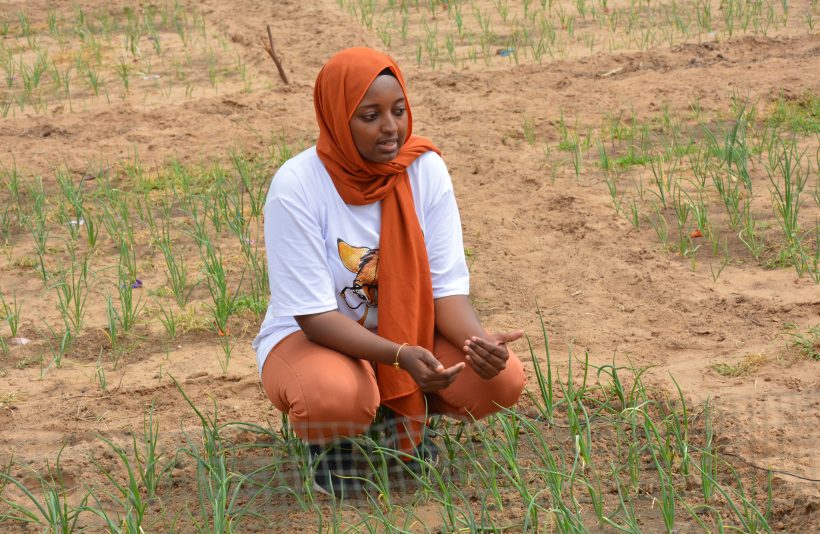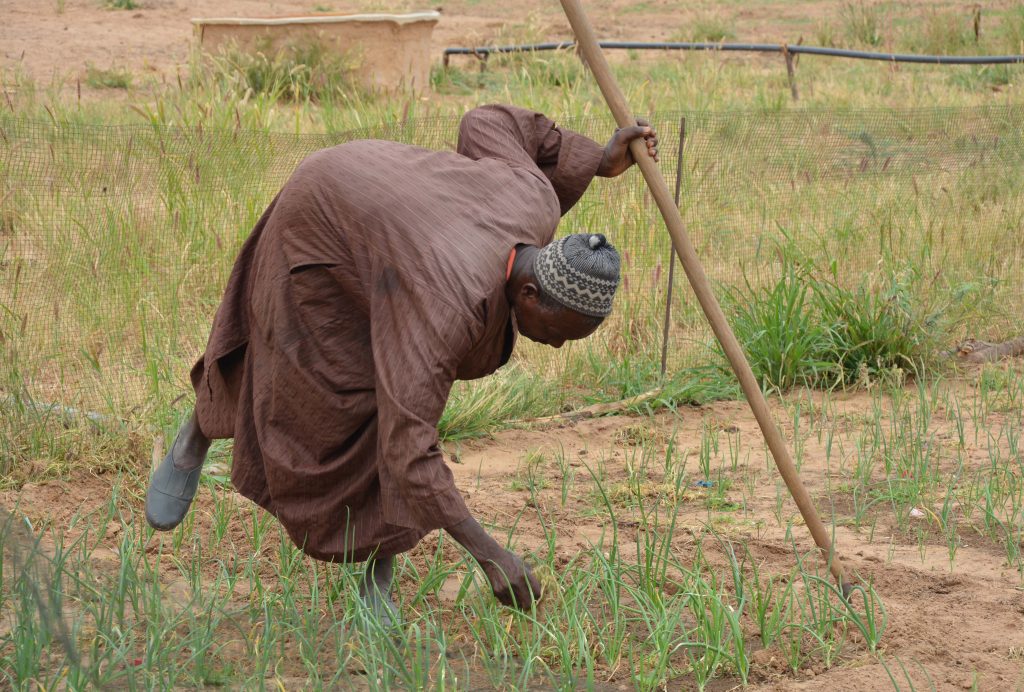
Ms. Deffa Wane explains the significance of hybrid seeds to rural farmers for trials during a farm visit to St. Louis, Senegal.
Onions are a prominent part of Senegalese food consumption and a significant contributor to the country’s economy, recorded as one of the priority crops in the country’s national development and growth strategy. The country’s annual production is 360,000 tons, produced by approximately 22,000 households, with a growing import of about 170,000 tons.
However, the changing climate characterized by erratic rainfall patterns and long drought seasons with extremely high temperatures threatens onion production, making it harder for smallholder farmers to grow enough to meet local demands or sell for extra income.
Thanks to scientific research, a new project is helping onion farmers adapt to the impacts of climate change. Ms. Deffa Wane, an agronomist and a 2019 One Planet Laureate Candidate, works with smallholder farmers to detect faults in the hybrid seeds and propose innovations that improve yields. “Crop production in the Niayes region does not reflect the real potential of the area, yet a conducive climate to growing vegetables characterizes the zone. My goal is to implement long-term sustainable solutions by transforming farming practices and increasing the agricultural productivity of irrigation systems,” says Deffa.
“For a long time, we have been facing long droughts, scarcity of rains that persist more and more, and a decline in onion productivity leading to the low food supply,” says Cheikh Sow, a smallholder farmer from the Niayes region in Saint Louis, Senegal.

Cheikh is a member of one of the farmer groups that Deffa works with within her participatory seed selection project. These farmers are trained to use innovative practices for growing onion crops from high-quality hybrid seeds that withstand the impacts of climate change while yielding more. They also get training and support to produce onion seeds for use and sale.
Deffa’s research focuses on optimizing fertilization and irrigation in onion production. The research involves a diagnostic study to understand the farmers’ constraints. Her findings noted an overuse of fertilizer and water for irrigation. Thus, while working with the farmers in onion production, Deffa focuses on optimizing fertilization (organic and mineral) and irrigation. She also develops experimental designs in the field, incorporating the farmers’ practices and recommendations from her research.
“On demonstration plots, we show the farmers that the combination of high-quality seeds and the right fertilization and irrigation enables higher yields. Some farmers have even doubled their yields by adopting these practices,” Says Deffa.
Deffa adds that her research also plugs the gap created by commercialized onion seeds that are priced higher. To improve the social and economic well-being and resilience of the farming households, she notes that it is vital for the farmers to produce their own seeds that are well adapted to their soil and climate.
“Onions are very expensive in the market. To produce our onion seeds and sell them to the market is incredible. We did not think we could do that. Ms. Deffa’s seeds and training came at the right time!” Cheikh affirms.
Another farmer, Assane Dieng, mentioned that the demonstration activities, like using adapted seeds, had armed him with the tools to deal with the changes in weather patterns and be more resilient. “My farming is like my business now. I know what best practices to adopt to increase production,” he says.
Agriculture employs 70 percent of Senegal’s workforce and contributes about 17% of the Gross Domestic Product. Deffa underscores that horticulture is increasingly becoming an accessible market for women and the youth in Senegal. Her goal is to contribute to the advancement of Senegalese agriculture. Therefore, she is determined to create opportunities for the youth and women to engage and sell their produce locally.
She adds that thanks to the One Planet Fellowship, she has learned to hone her research skills and apply herself better. She has also met other like-minded researchers, like her mentor, Dr. Lamine Diop, Lecturer-Researcher at Gaston-Berger University, who have been influential in her career progress.
The One Planet Fellowship is designed to build and enhance scientists’ mentoring, scientific, networking, and leadership skills working on the nexus between agriculture and climate change adaptation and mitigation. The scientists also focus on the multi-dimensional impacts of climate change on food systems while identifying and developing innovative solutions to effectively respond to the challenges, needs, and priorities of diverse population groups across the continent.
Watch the video here.
